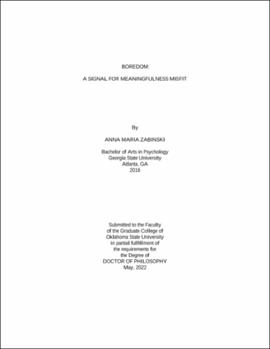| dc.contributor.advisor | Schurer Lambert, Lisa | |
| dc.contributor.author | Zabinski, Anna Maria | |
| dc.date.accessioned | 2023-03-23T20:30:17Z | |
| dc.date.available | 2023-03-23T20:30:17Z | |
| dc.date.issued | 2022-05 | |
| dc.identifier.uri | https://hdl.handle.net/11244/337157 | |
| dc.description.abstract | Boredom at work is a ubiquitous experience. Management research on workplace boredom has focused on factors such as workload or task variety as predictors of boredom and tied the experience to negative outcomes such as safety violations, disengagement, and counterproductive work behaviors. As a result, the common advice given to managers is to avoid boredom in the workplace. However, this advice may be premature. Conceptual work from sociology suggests boredom may also be caused by meaninglessness, acting as a signal that the present task might not be valuable or worthwhile. Further, boredom may act as a catalyst for positive outcomes. The purpose of this project is twofold: First, to test the proposition that boredom acts a signal for meaninglessness. Second, to explore the bright side of boredom at work. Results indicate that meaningfulness does predict boredom, specifically in situations when work is less meaningful than desired. Although the final study did not find a positive relationship between boredom and positive work outcomes, this research still makes three important contributions. First, studies 1a-c refine a definition of boredom and develop a corresponding measurement scale, setting the foundation for future research. Second, this work acknowledges that boredom stems from how employees come together with their work environment. Thus, this research offers a nuanced look at what is optimum. Third, this study makes a practical contribution by offering a new perspective for managers. In taking a nuanced view of how well employees fit within their environment, employers can be encouraged to foster workplaces where their bored employees can flourish. | |
| dc.format | application/pdf | |
| dc.language | en_US | |
| dc.rights | Copyright is held by the author who has granted the Oklahoma State University Library the non-exclusive right to share this material in its institutional repository. Contact Digital Library Services at lib-dls@okstate.edu or 405-744-9161 for the permission policy on the use, reproduction or distribution of this material. | |
| dc.title | Boredom: A signal for meaningfulness misfit | |
| dc.contributor.committeeMember | Dimotakis, Nikos | |
| dc.contributor.committeeMember | Greco, Lindsey | |
| dc.contributor.committeeMember | Flaherty, Karen | |
| dc.contributor.committeeMember | Danckert, James | |
| osu.filename | Zabinski_okstate_0664D_17612.pdf | |
| osu.accesstype | Open Access | |
| dc.type.genre | Dissertation | |
| dc.type.material | Text | |
| dc.subject.keywords | boredom | |
| dc.subject.keywords | meaningfulness | |
| dc.subject.keywords | Person-Environment Fit | |
| dc.subject.keywords | polynomial regression | |
| dc.subject.keywords | scale development | |
| thesis.degree.discipline | Business Administration | |
| thesis.degree.grantor | Oklahoma State University | |
